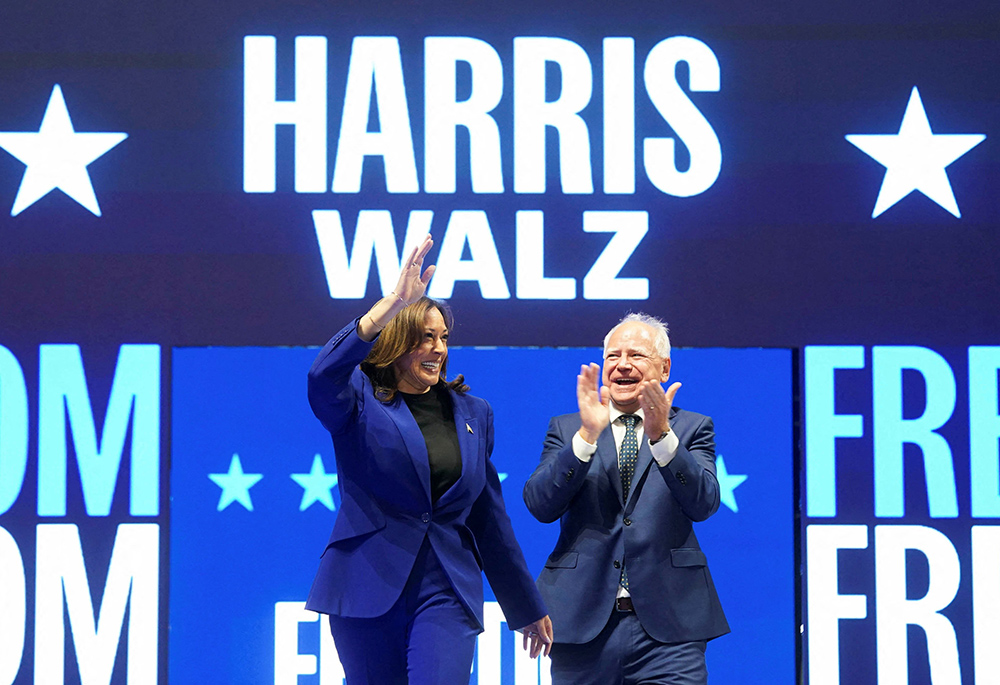
Vice President and Democratic presidential candidate Kamala Harris and her running mate Minnesota Gov. Tim Walz hold a campaign rally Aug. 20 in Milwaukee. (OSV News/Reuters/Kevin Lamarque)
As a loyal Catholic Christian, I accept the pro-life teaching of my church that "every human life, from the moment of conception until death, is sacred" (from the Catechism of the Catholic Church, Paragraph 2319). In this light, I view abortion as a serious moral issue, not simply a medical or legal one.
This being said, I recognize that some 80% of Americans favor allowing abortion, at least in certain circumstances. The great Catholic theologian, Thomas Aquinas, insisted that civil laws must reflect "the consensus of the governed." So, until the great majority of Americans generally oppose abortion, while allowing for rare exceptions, Catholics cannot impose our moral norms on the rest of society.
Even as I embrace the position of being pro-life, I must respect the moral discernment of those who are pro-choice; until a majority agrees, I cannot insist on my minority view as if it is the will of the people.
Thankfully, the U.S. Conference of Catholic Bishops, echoing the teaching of Pope Francis and Pope Benedict, have repeatedly taught that Catholics should not be "single-issue" voters. In particular, Pope Francis repeats often that "equally sacred" are the lives of those already born. Indeed, the U.S. Catholic bishops portray their holistic position as "defending life whenever it is threatened or diminished."
In this light, faithful Catholics who take a traditional position on abortion should not allow this alone to decide our vote. On the contrary, we must vote for the ticket most likely to promote a dignified quality of life for all and the works of social justice throughout our society. In such a broadened view, this Catholic, at least, must vote for the Harris-Walz ticket.
While Vice President Kamala Harris speaks repeatedly of reproductive rights, her policies, in keeping with the Democratic platform, will also mirror an array of reproductive responsibilities. For example, we can again expect better prenatal, natal and postnatal health care, especially for poor families. Add child care and preschool for all in need, lowering grocery costs, and universal health care. Her plans to help low-income people to buy their first home is an eminent instance of her commitment to family life and values.
Advertisement
And beyond family focused issues, the social commitments we can expect of a Harris-Walz administration amply reflect core Catholic values and moral principles. The deep Catholic commitment to the poor and needy, reflected so explicitly in the 168 diocesan programs of Catholic social services throughout our country, will be far better supported by the social ethic of Harris-Walz than the rich-favoring policies of another Trump administration.
A defining Catholic value across its two thousand years has been to "welcome the stranger"; indeed, it will be one of the criteria by which we will be judged (Matthew 25:35). The racist and toxic language with which Trump describes migrants at our southern borders, portraying poor refugee people as criminals and heightening immigrant fears, is the antithesis of Catholic social values.
Note, too, the growing teaching of the Catholic Church, and particularly under Pope Francis' leadership, to care for and protect our environment; Trump dismisses the global warming issue as trivial.
And contrast the moral promise of a Harris-Walz administration with the social ethics of Trump's previous presidency, most likely to be repeated should he gain a second term. So, he would refuse to address the 400-year-old pandemic of racism in our country, lend approval of Nazi-like hate groups, practice blatant misogyny, exploit the environment, encourage an economy that favors the rich, threaten our democracy, punish responsible critics, and the list goes on. As for personal ethics, note his incessant lying, his 34 legal convictions of falsifying business records, and being found liable for sexual abuse by a jury.
It is not for me to dictate the conscience-based decisions of other Catholics. But speaking from the depths of my own soul, not only may I vote for Harris-Walz, but I believe I must do so. To do otherwise would be contrary to my Catholic conscience.








